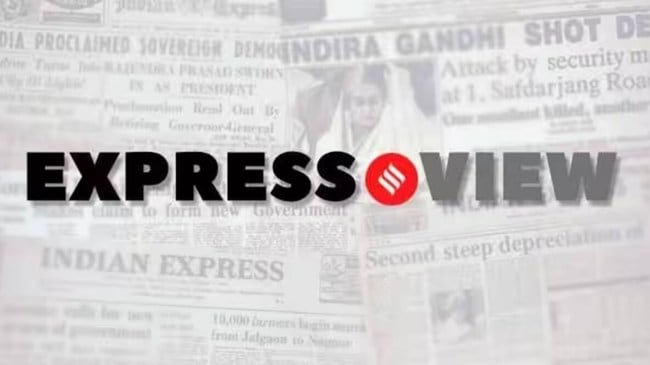Opinion In Mahmudabad case, SC order is, with due respect, an injustice to its own tradition on free speech
Any reading of the professor's posts makes it clear that no crime has been committed, nor was it intended. He was exercising his constitutionally protected right to free speech
 The Supreme Court did well to give Mahmudabad bail but its order of an SIT probe and its gagging a professor from writing or speaking does injustice to its own tradition.
The Supreme Court did well to give Mahmudabad bail but its order of an SIT probe and its gagging a professor from writing or speaking does injustice to its own tradition. CASE by case, the Supreme Court has expanded the ambit of free speech. Its interim bail order Wednesday is a disturbing course-reversal. It is tempting, with due respect, to see it as a one-off. What else could explain setting up a Special Investigation Team to “holistically understand the complexity of the phraseology employed and for proper appreciation of some of the expressions used” in two online posts by academic Ali Khan Mahmudabad on Operation Sindoor? This, even as it held forth on rights and duties and ordered a gag on Mahmudabad. SITs are constituted in special circumstances, in cases that involve a network of individuals or crimes, or when existing investigating agencies are deemed inadequate. At the centre of this case are words that are neither hidden nor coded, and an FIR, rather two, had already been registered by the Haryana Police. Any reading of the professor’s posts makes it clear that no crime has been committed, nor was intended. Mahmudabad was exercising his constitutionally protected right to free speech to articulate his concern over “reckless warmongering” and to point out that the “optics” of Colonel Sofiya Qureshi at the government’s briefing table during Operation Sindoor could slide into “hypocrisy”.
Unfortunately, Wednesday was no aberration. On Monday, the SC had directed the constitution of an SIT in a case which also involves free speech. In Madhya Pradesh, taking note of remarks that reflected the misogyny and prejudice that Mahmudabad is wrongly accused of — Minister Vijay Shah called Colonel Sofiya Qureshi a “sister” of Pakistan — the Madhya Pradesh High Court gave a suo motu order directing registration of an FIR against him. Hearing Shah’s petition challenging the HC order, the SC set up an SIT. Even as the Court’s rebuke to Shah was entirely deserved, the same question arose: Why an SIT? The minister’s remarks were caught on video — the SC bench also cites the video to question the lack of sincerity in his apology. What, possibly, would a committee comprising three senior IPS officers who do not belong to the state, one of them a woman officer, excavate that an ordinary police investigation could not?
The penalty for Shah should be political, it should come from his party. Instead of upholding the right to free speech, when the Court emphasises restrictions on it, and when it wades in further with a parallel investigation, it lets down the billion hopes that rest on it. Because the judiciary is the custodian of the individual’s fundamental rights in a democracy. In the Mahmudabad case, other institutions have also acquitted themselves less than honourably. While Ashoka University was quick to express relief at the interim bail to its professor, it had held back conspicuously from condemning his arrest. A “Statement of Objection” has been put out by a group of over 200 academics against Mahmudabad — they include Santishree Dhulipudi Pandit, Vice Chancellor of JNU, an institution that led the way, in an earlier time, in pushing the frontiers of debate. The Supreme Court did well to give Mahmudabad bail but its order of an SIT probe and its gagging a professor from writing or speaking does injustice to its own tradition. As multi-party teams take off to engage world capitals after Operation Sindoor, India’s delegates would do well to think of the answers they will give if they are faced with out-of-syllabus questions on the freedoms within.




